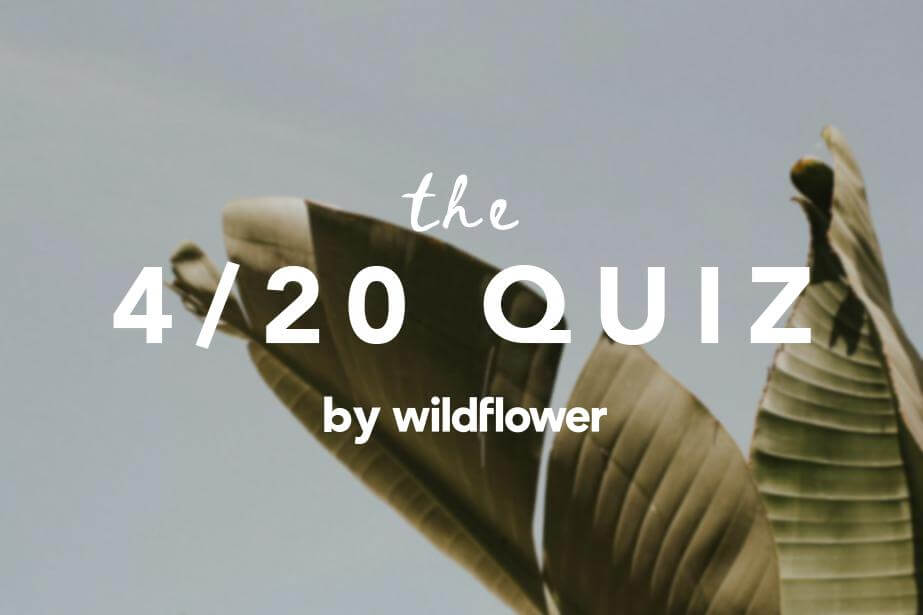
Test your CBD knowledge with Wildflower
To celebrate this year's 4/20, we run a fun little game to test your CBD knowledge. New quiz questions were available daily in our Instagram & Facebook Stories throughout the entire month of April. From CBD 101 to completely unexpected fun facts about CBD (do you know which US city has Googled the term 'CBD' the most in the last month?), the quiz could be enjoyed by anyone who follows us on social media. For those of you who missed that (or just simply would like to test your knowledge again!), we have prepared a quick recap of all the questions and their correct answers below. Have fun!
CBD works with Endonannabinoid System (ECS) that covers our whole body. The main role of ECS is to help the body naturally regulate itself regardless of the circumstances around it. It plays a role in how our bodies react to factors like pain, stress and inflammation, and communicates with other systems (including the nervous & digestive systems). Long story short - ECS is what aids our bodies' adaptiveness abilities.
CBD was officially discovered in 1940 but the efforst to isolate it were recorded as early as in 19th century! CBD's first official discovery in 1940 is attributed to Dr. Roger Adams and his team at the University of Illinois, however its structure was not fully elucidated until 1963. The earliest recorded medicinal uses of the cannabis plant itself date as far back as 1400-2000 BC.
No, it doesn't. CBD's psychoactivity is different to THC. While CBD does affect the body and the brain in some ways, it is considered 'nonintoxicating'.
Yes, it is. While the World Anti-Doping Agency lists natural and synthetic cannabinoids as prohibited, it has made CBD an exception. CBD has been removed as a banned substance in 2018. The United States Anti-Doping Agency and United Kingdom-Anti-Doping Agency do not have anti-CBD policies either. As a result, it is permitted to use CBD in sport.
No, it's not. CBD oil contains Cannabidiol. It is extracted from the cannabis plant and usually combined with a base oil (eg. coconut). Hemp oil is extracted from the seeds of the hemp plant and should not contain any cannabinoids. That means there should be no CBD in Hemp oil.
Yes, it can. The most common ways include inhalation, topical application and oral intake (eg. vaporizers, tinctures, capsules and salves).
Hemp and marijuana can both be sources of CBD. However, marijuana is naturally lower in CBD and higher in THC. In hemp, CBD dominates the plant’s makeup and that's why it's more common to derive CBD from hemp.
There are records suggesting that Queen Victoria's private doctor, Sir J. Russell Reynolds, has prescribed cannabis tinctures to treat her PMS in the 19th century. Whether she took it or not remains a mystery though.
Vermont! According to Google the top 5 states searching for the term 'CBD' in the past year are: 1. Vermont, 2. Colorado, 3. New Hampshire, 4. Wisconsin, 5. Tennessee
The winner goes to San Antonio! The top 5 'CBD-eager' cities according to Google in the last 30 days are: 1. San Antonio, 2. Dallas, 3. Houston, 4. San Diego, 5. Los Angeles
Slovakia is currently the only EU country that did not make an exception for CBD in their Cannabis laws. At the moment, there is no European consensus on whether cannabis should be legal or not, and therefore laws between neighboring countries can differ greatly. However, CBD is a legal exception everywhere but in Slovakia.
No, it's not. As everyone metabolizes compounds such as CBD differently, the proper dosage will vary for each individual. What might seem to work for some people, might not be as effective for others. It is important to remember that everyone's body is built differently and the needs will vary.
